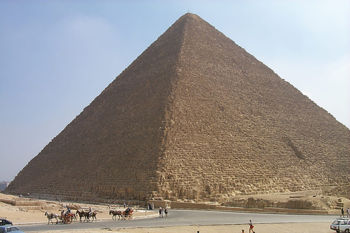History of Egypt
 From Citizendium - Reading time: 4 min
From Citizendium - Reading time: 4 min

The Great Pyramid of Giza is the most striking monument left by the people of Ancient Egypt.
Egypt has been inhabited for the past ten thousand years, and its ancient culture was one of the most important in antiquity, producing monuments like the Sphinx and pyramids. It was an important province in the Roman and Byzantine empires. In the 7th century, it was invaded by the Arabs, and thereafter became a center of Arab and Islamic scholarship. Today it is arguably the political and cultural center of the Arab world.
Ancient and Greco-Roman Egypt[edit]
- See also: Ancient Egypt
Egypt was first united around 3200 BC, by the Wild Bull Lord, Menes. The civilization created lasted for the next 3,000 years until 332 BC, when it was conquered by Alexander the Great. This era produced many magnificent temples and monuments, and of course the pyramids.
Origins of Ancient Egypt[edit]
By about 3,100 BCE, Egypt's early civilization had formed around one ruler. At this time, Hor-Aha, first king of Egypt, came to power, after the land was unified by his predecessor, Narmer. He and the next seven monarchs made up Egypt's first dynasty.[1] Narmer, however, is sometimes identified as the first true king, and there may have been other monarchs at this time whose names have been lost.
Conquest of Alexander the Great[edit]
Alexander and his armies arrived at Egypt in the autumn of 332 BCE. Initially the Persian governor (satrap) tried to resist him, but he soon surrendered, thus ending the second period of Persian domination over the country. Egyptian sources describe Persian rule as oppressive, so Alexander was seen more as a liberator than a conqueror.
Alexander travelled to the Oasis of Siwa in the Libyan Desert, famous for its oracle of the god Amun. The oracle is said to have declared him son of the god and therefore King of Egypt. In Memphis, he was crowned Pharaoh according to the Egyptian ceremony. He adopted as his throne name Mery-amun-Setepenre, which meant 'Beloved of Amun, Chosen by Re'. Rumours that Alexander was the fruit of an affair between Olympias and Nectanebo II, Egypt’s last native pharaoh, further helped to secure his status as new ruler of Egypt.
In the western region of the Nile Delta, at the site of a small Egyptian settlement called Raqote (or Rakhotis), he founded a new city, Alexandria. Although Alexander would establish new cities during his expedition (over 70, according to sources), Alexandria became the most important, an economic and cultural center of the Mediterranean world during the Ptolemaic and Roman periods. Alexander left Egypt in the spring of 331 BCE, leaving the administration of the country in the hands of Kleomenes of Naukratis and Ptolemy, one of his generals.
Egypt after Alexander[edit]
After Alexander, the Greek Ptolemy dynasty, descended from one of Alexander's generals, ruled until 30 BC, when Egypt fell to the Romans. It remained a province of the Romans, and later the Byzantines, until 639, when the Arabs conquered it.
Islamic Egypt[edit]
Egypt was an integral part of the Umayyad Caliphate and the later Abbasid Cailphate. In 969, it was conquered by the Fatimids, who built the city of Cairo to be their capital. In 1171, the Ayyubids under Saladin came to power. They were replaced by the Mamluks in 1250, who lasted until 1517, when the Ottomans took over.
Modern Egypt[edit]
In the 19th century, Egypt was gradually taken over by the British, who made it a de facto part of their empire, though it was only legally annexed in 1914. Egypt gained independence in 1922, though Britain retained influence behind the scenes. In 1952, the monarchy was overthrown in a coup, and after a brief struggle, Gamel Abdul Nasser came to power. He believed that all Arab countries should be united into one, and unified Egypt with Syria for a brief time, though the union (called the United Arab Republic) failed. He also opposed Israel, leading to his defeat in the Six Day War. In 1970, he was succeeded by Anwar Sadat, who made peace with Israel in the Camp David Accords. After Sadat's assassination, his Vice-President Hosni Mubarak took office. Egypt would be ruled by Mubarak and his National Democratic Party for the next 30 years, in a state of emergency that has lasted virtually unbroken since 1967, and under which many constitutional freedoms are suspended.
Demonstrations against Mubarak[edit]

Demonstrators in Egypt protesting against the 30-year rule of Hosni Mubarak climb on top of an army tank in Tahrir Square, Cairo.
Early 2011 saw the strongest anti-government demonstrations in Egypt's recent history, with thousands of people on the streets of Cairo to protest against his rule. The regime attempted to block the internet and shut down mobile phone use for a time, but protesters were still able to organise themselves and the armed forces largely stood by. Tahrir ('Liberation') Square in central Cairo became a focal point for protests, with demonstrators fighting pro-Mubarak groups in running battles that involved rocks being thrown, several deaths, hundreds of injuries and, at one stage, men loyal to the regime charging into the crowds on horseback and camels.[2]
Military regime[edit]
On 11th February 2011, after two weeks of demonstrations in which the army had largely declined to intervene, Mubarak was forced to step down in favour of an interim military leadership, the Supreme Council of the Armed Forces. According to the Egyptian Constitution, the Speaker of the lower house of the Parliament of Egypt, Ahmed Fathi Sorour, would have become acting President, but instead the leader of the Supreme Council, Mohamed Hussein Tantawi, became interim Head of State.[3] The state of emergency also remained in place. Two days later, amidst continued pro-democracy protests in Tahrir Square, the Supreme Council suspended the constitution pending a new one and dissolved Parliament.[4] Pro-democracy groups continue to await true reform.
Footnotes[edit]
- ↑ BBC News: 'New timeline for origin of ancient Egypt'.
- ↑ Coverage of the events in Cairo and across Egypt were covered by the BBC, CNN, Al-Jazeera and other major news organisations.
- ↑ BBC News: 'Egypt's Mubarak resigns as leader'. 11th February 2011.
- ↑ BBC News: 'Egyptian military dissolves parliament'. 13th February 2011.
 KSF
KSF